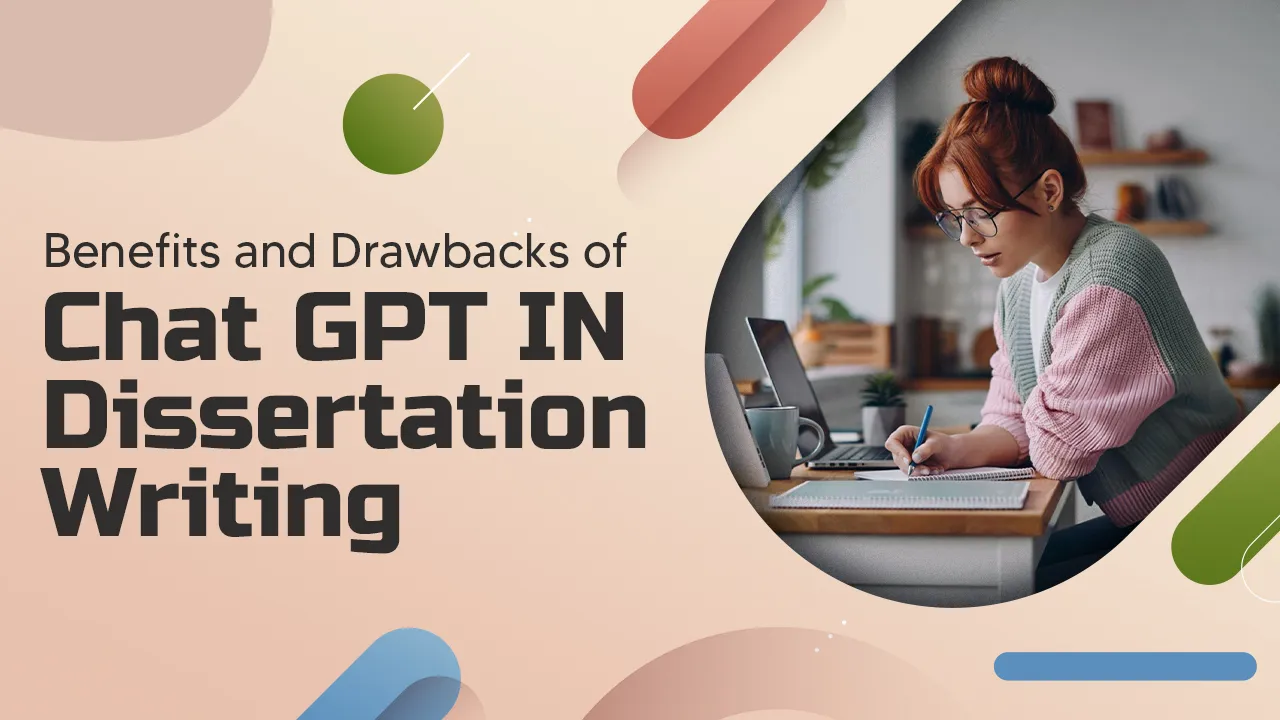Is ChatGPT the Future of Dissertation Writing, or Does It Present New Obstacles?

Contents
- Introduction
- Development of essay writing
- ChatGPT: Unveiling the Illusion of a Game-Changer
- Disadvantages of Relying on ChatGPT
- Frequently Ask Questions (FAQ's)
- Conclusion
Introduction
In recent years, integrating artificial intelligence and natural language processing has revolutionised various industries. One crucial area that has seen a substantial impact is dissertation writing. With the emergence of advanced language models such as ChatGPT, preparing academic papers has experienced both progress and challenges.
This article highlights the rise of ChatGPT and its shortcomings, which researchers and students should be alert to. When considering the pros and cons of ChatGPT in academic writing, it's important to acknowledge its potential to streamline the writing process while also being mindful of its limitations in maintaining coherence and originality.
Development of Dissertation Writing
In the past, dissertation writing was a laborious and time-consuming process. Researchers had to sift through many books, journals and articles to gather relevant information. Formulating ideas, structuring arguments, and refining language require much effort.

But ever since the dissertation help Writing Services have come, the burden on the students has been reduced. These services write your assignments with in-depth research and get students involved. Due to this, the knowledge of the students also increases.
ChatGPT: Unveiling the Illusion of a Game-Changer
The advent of ChatGPT has changed this scenario. With the power of artificial intelligence, researchers now rely on automated tools to generate content, suggest and even improve their writing. This remarkable technology has undoubtedly accelerated the pace of dissertation creation, but researchers and school students need to gain their skills.
The AI-powered tool helps non-native English speakers refine their language and style, creating more refined and professional-sounding dissertations. But ChatGPT can only scan for some time; It has its limits.
Disadvantages of Relying on ChatGPT
The integration of ChatGPT into dissertation writing has undoubtedly brought about several advantages, such as improved efficiency, idea generation, and assistance with language refinement. However, it is essential to acknowledge that there are also significant drawbacks associated with relying solely on ChatGPT for dissertation composition. Some of these drawbacks include:
1. Lack of Domain Expertise
ChatGPT lacks specialised knowledge in specific fields. Dissertations often require an in-depth understanding and analysis of complex subject matters. ChatGPT may not possess the necessary domain expertise to provide accurate and nuanced information, leading to potentially flawed or incomplete content.
2. Plagiarism and Originality Concerns
While ChatGPT can assist with generating content, there's a risk of unintentional plagiarism if the model draws heavily from existing sources. Maintaining the originality and authenticity of the dissertation becomes challenging when relying solely on an AI tool.
3. Quality Control and Inconsistencies
ChatGPT's responses can be inconsistent regarding quality and accuracy. The AI may generate paragraphs that vary in coherence, depth, and relevance, making it challenging to maintain a consistent and high-quality tone throughout the dissertation.
4. Limited Contextual Understanding
ChatGPT's understanding of context can be improved. It might misinterpret prompts or fail to capture the nuances required for a particular argument or analysis. This could result in content that needs to be more on-topic or deviates from the intended focus of the dissertation.
5. Absence of Critical Thinking and Original Insight
A crucial aspect of a dissertation is the development of original insights and critical thinking. ChatGPT is limited to patterns it has learned from existing text, and it might need help to provide novel perspectives or engage in deep analytical thinking that is often expected in academic work.
6. Formatting and Structure Challenges
A dissertation involves adhering to specific formatting and structural guidelines. ChatGPT might need to improve, ensuring the document follows the required structure, citation style, and other formatting criteria.
7. Ethical Considerations
There are ethical concerns about relying solely on AI like chat gpt for critical academic writing tasks. Proper credit and attribution for ideas and content generated by ChatGPT could be more precise, potentially raising academic integrity issues.
8. Dependency and Skill Erosion
Over-reliance on ChatGPT could lead to a decline in critical writing skills among students. Relying on AI for content creation might deter learners from actively engaging with the writing process, hampering their ability to develop essential communication skills.
9. Lack of Personalisation
Dissertations often reflect a student's growth and academic journey. Relying on an AI tool might result in content that needs more individuality and personal touch that can make a dissertation stand out.
Frequently Ask Questions (FAQ's)
1. What is a Limitation of ChatGPT in Research?
ChatGPT is powerful, but yet it has limitations in the area of academic research. It lacks domain knowledge which leads to inaccuracies in specialised fields of study. it cannot generate original research. It is always advised to researchers that they should use ChatGPT as a tool in place to complement, rather than completely replace the traditional methods of the research.
2. Can I Use ChatGPT for My Dissertation?
ChatGPT assists in generating ideas related to the unique content. It is not recommended that one should use it as the sole source for a dissertation. You can use it as a tool for brainstorming ideas. However, make sure to supplement it with the best comprehensive research so that it can meet the standards of a dissertation.
3. Is There Any Limitation in ChatGPT?
ChatGPT is a powerful tool still it has some limitations. It struggles with generating highly technical content. Additionally, it is also not considered immune in place to biases present in its training data. It is said that users should be known of all these limitations. They should try to supplement ChatGPT's responses with critical thinking when necessary.
4. How Does ChatGPT Affect Academic Writing?
ChatGPT acts as an aid in academic writing by giving all the insights related to all the aspects of generating ideas. ChatGPT may hinder the critical thinking skills of the students. Use it as a complementary tool in the process of thorough research.
5. What are the Disadvantages of GPT?
GPT models such as ChatGPT offer capabilities but they have certain limitations. These include the generation of irrelevant responses, the inability to know the context, and many more. Approach GPT models with awareness of all these limitations.

Conclusion
The rise of ChatGPT in dissertation writing presents a mixed bag of opportunities and challenges. While technology undoubtedly increases efficiency and helps overcome barriers, its limitations in contextual understanding, the potential for plagiarism and inaccuracies underscore the importance of human participation and critical thinking in the research process. To avoid all these problems, students can also take the help of writing services. Their AI dissertation writer provide you with professional assignment writing.
Your email address will not be published. Required fields are marked *
20% OFF!




This topic offers a nuanced perspective on the challenges posed by ChatGPT in dissertation writing. It's a reminder that while AI technology has its merits, it cannot replace the depth of human understanding in scholarly endeavors.
An insightful examination of ChatGPT's shortcomings in dissertation writing. This discussion highlights the complexities of academia and the importance of human creativity and critical thinking in research.
I appreciate this discussion on ChatGPT's limitations. It's a reminder that while AI can assist, human insight and expertise remain indispensable in academic research.
I value the discourse on the limitations of ChatGPT. It serves as a reminder that although AI offers assistance, human insight, and expertise are essential in academic research, emphasizing their irreplaceable role.
This subject provides a nuanced view of the hurdles presented by ChatGPT in dissertation composition. It underscores that while AI has advantages, it cannot supplant the profound comprehension provided by human involvement in scholarly pursuits.